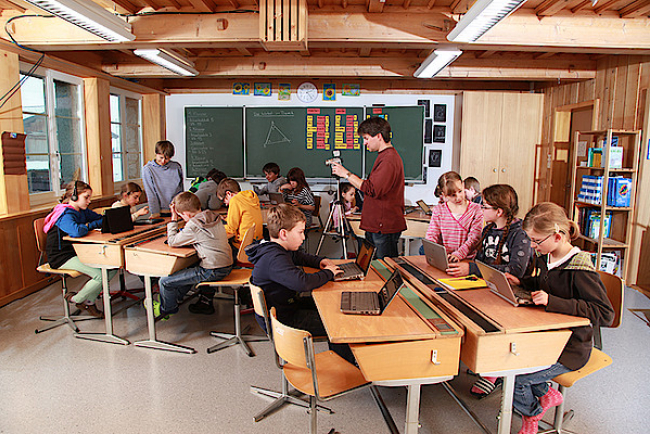Research on Teacher's Professional Development and Teacher Careers
Welcome to the project website of our research team!
We are a small research team from the University of Teacher Education in Bern, Switzerland, engaging in research on teacher development and careers.
Teachers’ professional education as a research focus
Given the growing professional mobility in an ever-changing educational landscape, it is no surprise that teacher education and careers are changing as well. While lifting teacher education from secondary to the tertiary education level at the beginning of the new millennium, Swiss universities for teacher education have simultaneously started to introduce alternative admissions and special study programmes for second career teachers. In the Swiss capital, the University of Teacher Education PHBern offers a preparatory course and entrance exam for professionals without a higher school certificate who want to become teachers. As a result, approximately 20-25% of students at PHBern have had previous careers.
But what are the (biographical) characteristics, qualifications and experiences that students with different backgrounds bring into teacher education and the teaching profession? What are the benefits, challenges and developmental prospects for prospective and active teachers with different backgrounds? Why do some prosper in this field, while others drop out? What are the preconditions that help them become and stay successful teachers? While these questions are important for the recruitment, training and further education of successful teachers, we don’t yet have much systematic knowledge in this regard. This is why we are addressing these issues in our research projects.
Research Projects
On this website, we provide information about two research projects dealing with teacher careers:
- BaL I, 2013 - 2016: A first project with the title BaL I (Berufsleute als Lehrpersonen I / Professionals as teachers I: Second career teachers’ resources, retention and attrition; with Prof. Dr. Ueli Hostettler) focussed on career switchers’ professional well-being and field of occupation 7-10 after receiving their diploma. We found that career switchers were as loyal to teaching as first career teachers, with approx. 70% still working as active teachers in both groups. Teacher well-being, self-assessment of skills and attrition reasons differed quite distinctly between first and second career teachers, leading to the question what resources and skills career switchers bring into the profession and whether these might influence professional development during teacher education and eventual career decisions. This was the basis for a new project, focussing on teacher education students:
- BaL II, 2017 - 2020: Our second project BaL II (Berufsleute als Lehrpersonen II/ Professionals as teachers II: Prospective teachers’ professional development in the context of their educational and professional biographies) follows two cohorts of teacher education students from study entry to their final degree, examining their entry characteristics, their challenges and coping resources, well-being, academic performance, and potential drop-out from the study programme.
Contact us
Let us know if you have any questions or suggestions. You will find our contact details on our team website.
Second Career Teachers' Resources, Retention and Attrition
Objective
In the context of recurring teacher shortage, second career teachers are being focused on as a prospective talent pool in many countries. So far, only few studies have examined what resources and skills they bring into the profession, how these skills shape their professional development, and how long they remain in the teaching profession after graduation. The objective of this project was to examine the professional development of second-career teachers in a longitudinal study.
Approach
The project is based on two earlier studies investigating the professional motives and personal resources of pre-service second career teachers. In the current project, the participants questioned in the two earlier studies were surveyed again, 7-10 years after graduation from the University of Teacher Education Bern (Pädagogische Hochschule PHBern).
We focused on the following questions using questionnaires as well as semi-structured interviews:
- Career entry: What defining challenges and positive experiences are reported from the first years of teaching? What skills and resources helped participants to cope with these challenges?
- Transfer of expertise: Do second career teachers perceive transfer of skills and expertise from their former trainings and/or occupation to the teaching profession?
- Career path: What is the actual employment situation 7-10 years after graduation from teacher education? Are the study participants still in the teaching profession, have they reduced their workload, do they intend to leave the teaching profession, or have they already withdrawn from teaching?
- Occupational well-being: How high are job satisfaction, self-efficacy and occupational strain in participants who are still working as teachers? Do first and second career teachers differ in their occupational well-being?
The findings provide insight into the specific resources and career paths of second career teachers compared to first career teachers, as well as the interaction of the factors listed above.
Results
The questionnaire survey is completed.
959 former LLB/PH students were contacted via mail or e-mail, all of them graduated between 2004 and 2008. A total of 431 people participated in the study, representing the relatively high response rate of 47 %.
79.5% of the respondents were women, 20.5% men. The mean age was 35 years (SD 7 years). The sample consisted of 68.8% first career teachers and 31.2% second career teachers. Of the 68.8% second career teachers, 85% had been working in their first profession, the rest had no work experience in their first career.
23 interviews were conducted with 14 second career teachers still remaining in the teaching profession and 9 second career teachers who were not working as a teacher anymore at the time of the survey.
Further analyses will follow.
